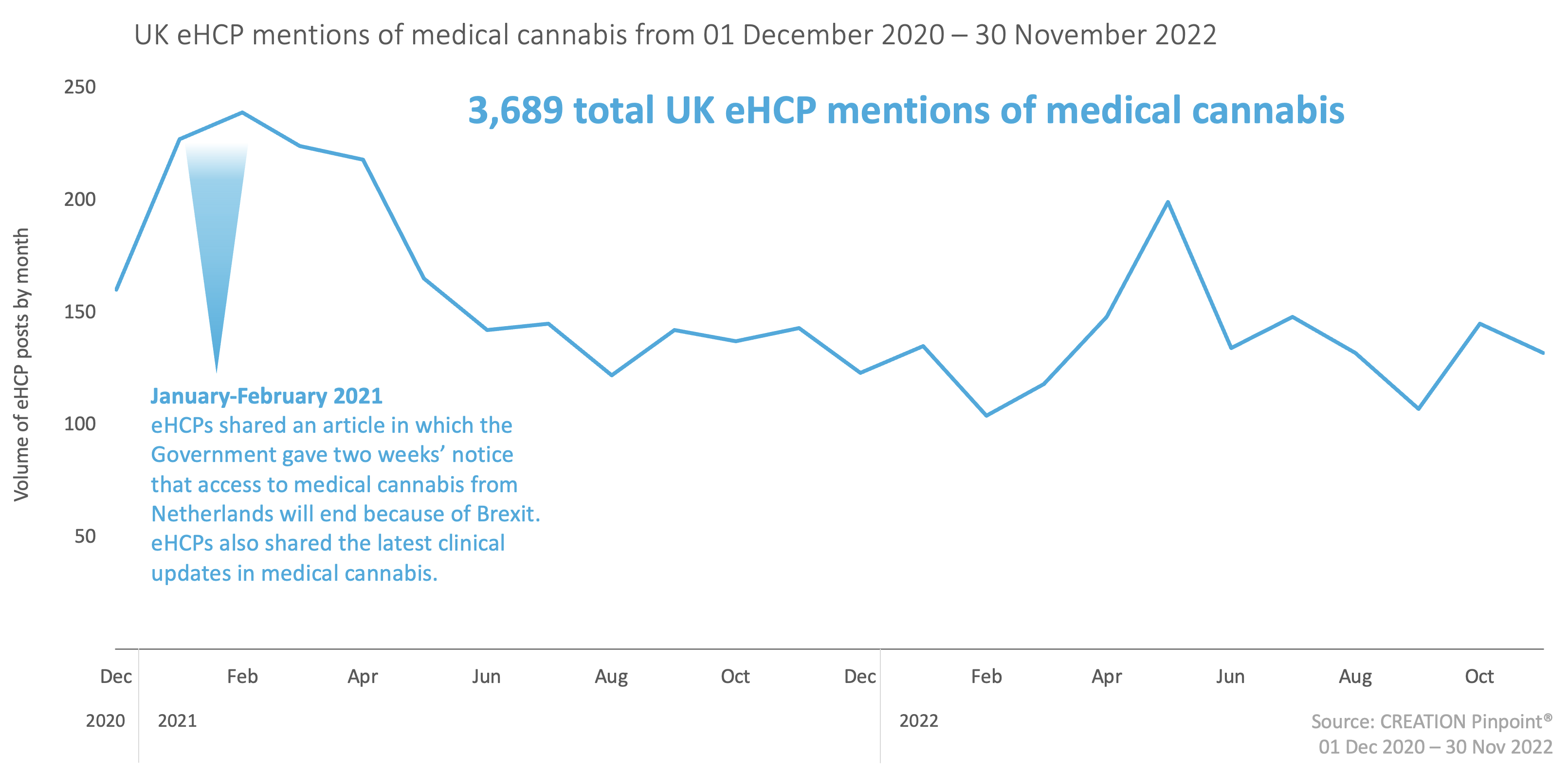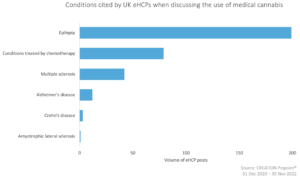The term “medical cannabis” or “medicinal marijuana” can be used when describing many forms of cannabis-based medicine used to relieve symptoms from various conditions. Many see medical cannabis as a complementary and alternative medicine option to relieve patients of their symptoms for conditions including Alzheimer’s disease, Amyotrophic lateral sclerosis (ALS), HIV, Crohn’s disease and more.
Although medicinal products containing cannabis-derivatives are regulated, many cannabis-products are available online from diverse sources. Because their quality and content are not always known, they may potentially be dangerous; for these reasons the topic of medical cannabis has historically for a long time been seen as taboo by HCPs.
However, in recent months many eHCPs have been discussing this topic, in fact over the last two years 1,209 UK eHCPs have used their social media profiles to discuss medical cannabis and its potential in healthcare.

Do eHCPs think medical cannabis is effective and, if so, for what conditions?
From the conversational analysis of UK eHCPs in the last two years, some have been identified as strong advocates, including the top 10 most frequently posting eHCPs who made up 30% of the conversation. Their support for medical cannabis is largely based upon its clinical efficacy in relieving symptoms of certain conditions. Of these conditions, epilepsy was heavily cited, with almost 200 eHCP posts supporting the use of medical cannabis for this condition in the past 2 years.

As highlighted by the spike in conversation in January 2021, eHCPs showed their support online to Hannah Deacon. Ms Deacon was urging the government to act, following a notice by the Department of Health and Social Care that in just two weeks’ her son’s (Alfie) supply of a life-changing cannabis medicine from the Netherlands would stop because of Brexit.
NEW: Govt gives 42 kids with rare and severe form of epilepsy just 2 weeks notice they will no longer be able to get medicine from Netherlands because of Brexit
Alfie Dingley's mother blasts Boris Johnson and dept of health; implores them to do something https://t.co/AijNUL1e4O— Lisa O'Carroll (@lisaocarroll) January 5, 2021
This was not the last time that UK eHCPs responded to UK government policy. In December 2021, HCPs shared Labour MP for Middlesbrough Andy McDonald’s tweet, in which he expressed disappointment that the Medical Cannabis Access Bill was not successful..
I asked Tory MPs not to talk out the Medical Cannabis Access Bill so it'd progress to the next stage. Sadly I wasn't successful.
They killed the Bill and with it the hopes of families like mine who have children with epilepsy, desperate for a positive response from Government. pic.twitter.com/ZDu3J5FsKx
— Andy McDonald MP (@AndyMcDonaldMP) December 13, 2021
Guidance regarding the use of medicinal marijuana (which include many barriers to access following concerns about the perceived lack of scientific evidence – only 18 people in the UK received a prescription in 2019), are vastly different in different countries. In the UK, medical cannabis can be legally accessed with a prescription to treat side effects including seizures from severe forms of epilepsy, nausea caused by chemotherapy and muscle stiffness and spasms caused by multiple sclerosis. However, in the US the laws extend to conditions including Alzheimer’s disease, amyotrophic lateral sclerosis, HIV/AIDS, glaucoma and more.
A boy who used to endure 500 life-threatening fits a month is set to celebrate his 1,000th seizure-free day, thanks to medical cannabis.
Read more from the Mirror's latest medical cannabis article by following the link below ⬇️https://t.co/2hwu2SMf7I
— The Medical Cannabis Clinicians Society (@ukmccs) November 11, 2022
Whilst UK eHCPs largely referenced these more familiar examples when discussing the benefits of medical cannabis, other conditions were also cited, including the potential benefits of medical cannabis for mental health. At CREATION.co we have previously covered the topic of psychedelics within mental health care with the recent arrival of psilocybin in the medical setting. Additionally, other holistic benefits including a reduction in alcohol consumption was found in a survey of over 2,000 people involved in the Canadian medical cannabis program.
eHCPs note reluctance to prescribe medicinal cannabis
However, when discussing these potential benefits, eHCPs also noted the reluctance of some doctors to prescribe medical cannabis.
Good evidence it works, is well tolerated and is cost effective. It doesn’t cause euphoria with low risk of abuse.
In psychiatry it can be used for anxiety disorders.
Prescribers need better pharmaceutical options than THC:CBD ratio.
Many doctors are reluctant to prescribe… pic.twitter.com/I6jmx40BO5— Dr Cyrus Abbasian (@abbasian) November 8, 2022
Moreover, even with the laws in the UK enabling some patients to access medical cannabis there is a belief amongst some eHCPs that many of their peers, including neurologists, “refuse to discuss the potential benefits of [medical cannabis] for children suffering daily seizures”.
One of the reasons, identified within the data, for this reluctance to fully discuss the topic is that some eHCPs believe that increased acceptance and encouragement of medical cannabis from medical professionals could be seen as irresponsible. A key concern is that it may lead some patients to self medicate which has the potential to be dangerous.
Decriminalisation and legalisation of psychoactive drugs will come with collateral damage. Proper discussion and debate is absolutely critical.https://t.co/KaNaxEGSKi#medicine #marijuana #treatment #addiction #psychadelics #alcohol pic.twitter.com/PLVn9aaBqD
— Dr. Jonathan Iliff (@PsykeUK) July 10, 2022
What can we expect to see in the future of medicinal cannabis?
It is likely that eHCPs will play a role in implementing a change in policy for medical cannabis. Many eHCPs from various specialties frequently experience patient demands for medical cannabis and show a degree of openness to using it. Moreover, the United Nations removal of cannabis from the list of the world’s most dangerous drugs, could pave the way for a new era of medical cannabis research.
There was a wide gap in terms of willingness to provide medical cannabis though. While eHCPs with family members who could benefit from medical cannabis are using their online presence to promote policy change, most physicians say they lack knowledge of its beneficial effects, adverse effects and of how to advise patients, which may comprise barriers towards prescribing.
#CBD is probably the most frequent non-medicine that patients ask me about taking with their cancer treatments.
Having facts rather than vague opinions ("we don't know, so don't recommend") is genuinely helpful. https://t.co/NZTne6NCTD
— Calum Polwart (@ShinyBlackShoe) August 28, 2022
CREATION.co will follow the latest developments in the eHCP conversation around medicinal cannabis. Our insights could help policy makers to shape policy in a way that ensures concerns, such as the quality and distribution of medical cannabis products, are addressed.
Furthermore, insights from the online conversation may allow manufacturers of medicinal cannabis to understand unmet patient needs, learn why some eHCPs passionately support medical cannabis production, and hear potential concerns around specific products. A thorough understanding of eHCP concerns could inform trial design – ensuring the most appropriate efficacy and safety endpoints are included. Additionally, PAGs may be able to learn from clinical reluctance to prescribe, and understand what resources/changes may achieve greater levels of HCP support.
To keep up to date with the latest HCPs views on medical cannabis and other health related topics, sign up for our CREATION Knowledge eJournal, or get in touch.
 By Mark Sullivan
By Mark Sullivan 


